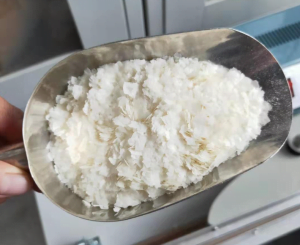رقائق البطاطس هي المنتج النهائي الذي يتم الحصول عليه بعد معالجة البطاطس الطازجة من خلال سلسلة من الخطوات بما في ذلك التنظيف, تقشير, تبخير, يهرس, والتجفيف.
في الأساس, يمكن اعتبار رقائق البطاطس نوعًا من منتجات البطاطس المجففة. تظهر على شكل رقائق صغيرة تشبه ندفة الثلج, بشكل رئيسي في الأصناف البيضاء والصفراء, وهناك أيضًا رقائق بطاطس أرجوانية يتم معالجتها من البطاطس الأرجوانية.
كمحترف في إنتاج واستخدام رقائق البطاطس, اسمحوا لي أن أقدم لكم هذا المنتج من وجهات نظر مختلفة.

كنوع من منتجات البطاطس المجففة, ما الذي يجعل رقائق البطاطس مميزة؟?
تكنولوجيا المعالجة
هناك أنواع عديدة من منتجات البطاطس المجففة التي يتم مشاهدتها بشكل شائع في محلات السوبر ماركت, مثل قطع وشرائح البطاطس المجففة. عمومًا, يتم إنتاج قطع وشرائح البطاطس المجففة باستخدام تقنيات التجفيف بالتجميد, لكن عملية تجفيف رقائق البطاطس مختلفة تمامًا.
جوهر معالجة رقائق البطاطس هو تجفيف الأسطوانة الكبيرة. عندما يتم تجفيف هريس البطاطس في براميل كبيرة, تشبه رقائق البطاطس أوراقًا مرتبة بدقة, والتي يتم بعد ذلك تقسيمها إلى رقائق. بسبب الحاجة إلى تجفيف الأسطوانة الكبيرة, عادة ما تكون مصانع رقائق البطاطس ذات حجم كبير.
تريد معرفة المزيد عن معالجة رقائق البطاطس, يرجى التحقق من مقالتي:
ما هي رقائق البطاطس? كيف يتم صنع رقائق البطاطس?
الاستخدامات الرئيسية
أجرؤ على القول أنك ستجد صعوبة في شراء رقائق البطاطس مباشرة من أي سوبر ماركت, لأنها في المقام الأول منتج وسيط في إنتاج الغذاء. على سبيل المثال, منكه بطاطس مهروسة, رقائق البطاطس المركبة, والبسكويت المتنوع يستخدم رقائق البطاطس كمكونات.
لماذا تستخدم رقائق البطاطس كمكون غذائي؟?
- اعتمادا على الكمية المستخدمة, تضفي رقائق البطاطس درجات متفاوتة من نكهة البطاطس الطبيعية وتساهم في تكوين الطعام, مما يجعلها عنصرا حاسما.
- أثناء الخبز, رقائق البطاطس تخضع لرد فعل ميلارد, خلق لون يشبه الشواء يعزز جاذبية المخبوزات, تحفيز الشهية.
- تتميز رقائق البطاطس بقيمة غذائية عالية لأنها منتج مجفف يحافظ على جزء كبير من العناصر الغذائية للبطاطس, بما في ذلك الفيتامينات. نسبيا, محتواها الغذائي يشبه محتوى التفاح.
الميزة الأبرز
ربما غير معروف للكثيرين, إن الميزة البارزة لرقائق البطاطس لا تقتصر على مذاقها وقيمتها الغذائية فحسب، بل إنها أيضًا على خصائصها الفيزيائية، ألا وهي قدرتها الاستثنائية على معالجة الجفاف.
إذا صب 100 جرامًا من الماء 20 غراماً من رقائق البطاطس, داخل 1-2 ثواني, سوف تمتص الرقائق كل الماء, تحويلها إلى بطاطس مهروسة.
لذا, ما فائدة هذه القدرة القوية على معالجة الجفاف?
- يستخدم الكثير من الناس رقائق البطاطس كعنصر في طُعم الصيد. عندما يتم غمر الطعم في الماء, تعمل عملية الإماهة السريعة لرقائق البطاطس على تشتيت نكهة الطعم بسرعة, جذب الأسماك من بعيد. لذلك, فكر في استخدام رقائق البطاطس في المرة القادمة التي تذهب فيها للصيد.
- استخدام شائع آخر هو في البطاطس المهروسة, حيث تتيح قدرة رقائق البطاطس على الإماهة السريعة تحضير البطاطس المهروسة اللذيذة بسرعة وسهولة. بالطبع, العديد من المنتجات الغذائية الأخرى تستخدم أيضًا هذه الخاصية.
تصنيف رقائق البطاطس
مظهر المنتج:
- هناك نوعان رئيسيان: رقائق البطاطس ورقائق البطاطس المطحونة.
- تستخدم رقائق البطاطس في المقام الأول في إنتاج المواد الغذائية والوجبات الخفيفة, بينما رقائق البطاطس المطحونة, الأرض إلى صفاء 80 شبكة أو أدق, تستخدم في إنتاج مساحيق البطاطس المهروسة المتبلة وأطباق البطاطس الأساسية.
- لا يوجد فرق كبير بين النوعين; رقائق البطاطس المطحونة هي ببساطة نسخة أرقى من رقائق البطاطس.
تصنيف اللون:
رقائق البطاطس عادة ما تأتي باللون الأبيض, أصفر, والأصناف الأرجوانية, بكثافة متفاوتة من عمق الألوان بسبب اختلاف أنواع المواد الخام للبطاطس الطازجة المستخدمة. الرجوع إلى مقالتي:
رقائق البطاطس | ما هي أصناف البطاطس المستخدمة في الإنتاج?
تصنيف المنشأ:
المناطق الرئيسية المنتجة لرقائق البطاطس في جميع أنحاء العالم تشمل أوروبا, أمريكا الشمالية, روسيا, والصين, ولكل منها خصائص مميزة تتأثر بشكل أساسي بأنواع البطاطس المستخدمة.
كيفية اختيار رقائق البطاطس?
يجب عليك مراعاة عدة عوامل مهمة عند اختيار رقائق البطاطس:
إلى جانب الطرق التي ذكرتها هنا, يوجد المعيار الوطني الصيني لرقائق البطاطس كمرجع لجودة رقائق البطاطس.
أحدث المعايير الوطنية لرقائق البطاطس في الصين في 2024 (اعتبارًا من 14 مايو)
مظهر:
تحقق من وجود أي بقع داكنة أو تغير في اللون في رقائق البطاطس. يشير النقاء العالي إلى جودة أفضل للمواد الخام.
القدرة على الإماهة:
قم بإجراء اختبار بسيط عن طريق خلط رقائق البطاطس مع الماء في وعاء 1:5 نسبة لملاحظة مدى سرعة امتصاصها للماء. يشير الامتصاص الأسرع إلى رقائق البطاطس عالية الجودة.
النشا في رقائق البطاطس:
يتطلب معدات أو كواشف متخصصة للقياس, مع انخفاض محتوى النشا مما يشير إلى رقائق البطاطس عالية الجودة. لمزيد من التفاصيل حول هذه العلاقة, الرجوع إلى مقالتي:
ما هي الاختلافات بين رقائق البطاطس والنشا?
العلامة التجارية لرقائق البطاطس:
بسبب متطلبات الإنتاج العالية, فقط المصانع الكبيرة يمكنها تصنيع رقائق البطاطس. يُنصح باختيار العلامات التجارية ذات السمعة الطيبة والمعروفة بإنتاج رقائق البطاطس عالية الجودة. في الصين, تشمل الخيارات XION, هونغجي, وشويتشوان, من بين أمور أخرى. لمزيد من المعلومات, الرجوع إلى مقالتي:
قمة 10 مصنعي رقائق البطاطس في الصين
ملخص المؤلف
يلخص المحتوى أعلاه بعض الجوانب الأساسية لإنتاج رقائق البطاطس وتطبيقها, من وجهة نظر محترف في هذا المجال. وآمل أن أدخل في مزيد من المناقشات معك. لا تتردد في الاتصال بي في أي وقت لطرح الأسئلة المتعلقة بهذا الموضوع.